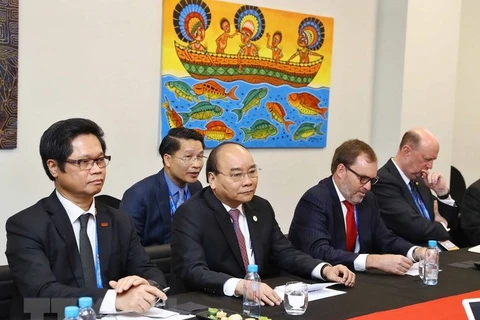 National Assembly Vice Chairman Phung Quoc Hien (R) receives Pfizer Group's Regional President for Asia and Emerging Markets Pierre Gaudreault (Source: VNA)
National Assembly Vice Chairman Phung Quoc Hien (R) receives Pfizer Group's Regional President for Asia and Emerging Markets Pierre Gaudreault (Source: VNA) Hanoi (VNA) – US-based Pfizer Group, one of the world's premier biopharmaceutical companies, has signed an agreement on the transfer of pharmaceutical production technology to Vietnamese enterprises, so first products are scheduled to be produced in 2020.
The information was made by the group’s Regional President for Asia and Emerging Markets Pierre Gaudreault in a meeting with Vietnam’s National Assembly Vice Chairman Phung Quoc Hien in Hanoi on January 10.
Pierre Gaudreault affirmed that the signing of the deal shows Pfizer’s commitment to long-term investment in Vietnam, thus contributing to the country’s pharmaceutical industry and applying technology with international standard in its drug production.
According to him, the group decided to invest in Vietnam as it sees potential of the Vietnamese market and its surrounding areas as well as the country’s open investment policies.
He pledged to share the group’s best experiences with Vietnamese enterprises, while hoping that the Vietnamese Government will continue creating conditions on policies and procedures for the group to expand its presence in the country.
NA Vice Chairman Phung Quoc Hien stated that the transfer of technology is a breakthrough in the two sides’ cooperation. This not only is a good chance for Vietnam’s pharmaceutical producers to improve their capacity, but also helps Vietnamese people buy high-quality drugs at reasonable prices.
He suggested Pfizer study Vietnam’s climate to produce types of drugs that are suitable to Vietnamese and Southeast Asian markets.
He affirmed that Vietnam will facilitate investment of foreign enterprises, including Pfizer.-VNA
VNA























